Deploy Configuration
Definitions
| Target | A device the user wants to deploy the application. Can reside in local area network or remote network. |
| Localhost | This computer |
Deploy Configuration
The Deploy Configuration describes to which physical hardware devices the system shall be deployed (installed). CDP Studio supports distributed systems and the applications in a system can be deployed to different target devices in the network.
The Deploy Configuration allows you to search a network for target devices and assign applications to a device.
The Deploy Configuration is found in Configure mode by clicking on the Deploy Configuration tab .
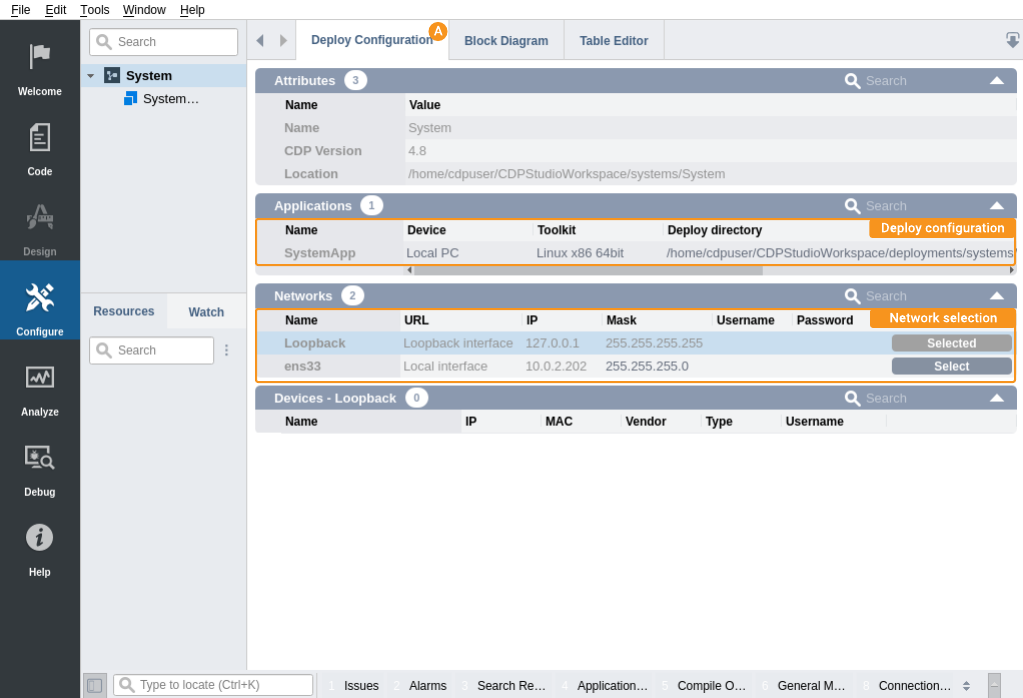
Prerequisites
The target device must have:
- SSH Server: Must be running on port 22.
- The target must have support for either rsync or for sftp.
Note: Rsync is recommended for faster deployment. If rsync is not available, the deployment will default to using sftp, which is significantly slower.
Windows Target
For Windows, a Cygwin SSH server should be used. Rsync as well can be found from Cygwin installer.
Linux Target
For Linux, both are usually available through a package manager. For Debian the command would be (run as root user):
apt-get install openssh-server rsync
Please consult the manual of your Linux distribution to correctly set up and configure the SSH server.
Search for the Device
By default, all applications are deployed to the localhost. To deploy to other devices, you must first select a network interface where the target device could be found (). Once selected, a device scan will begin.
Any devices found on the network will be listed in the devices table. This table displays all devices with port 22 open (the default port for an SSH server).
To successfully deploy to a device, you must provide a valid username () and pair the device (). After entering the correct credentials, the device’s IP, MAC address, Vendor and Type should be automatically detected and populated in the device list.
CDP Studio will automatically search for a toolkit that best matches the device's operating system and the current CDP Framework version. It will then populate the Device Compatible Toolkit list (), prioritizing the best match at the top.
Note: The toolkit selection may not always be perfect. If you encounter issues with the selected toolkit, or if the default choice is unsuitable, you can manually select an alternative (when available).
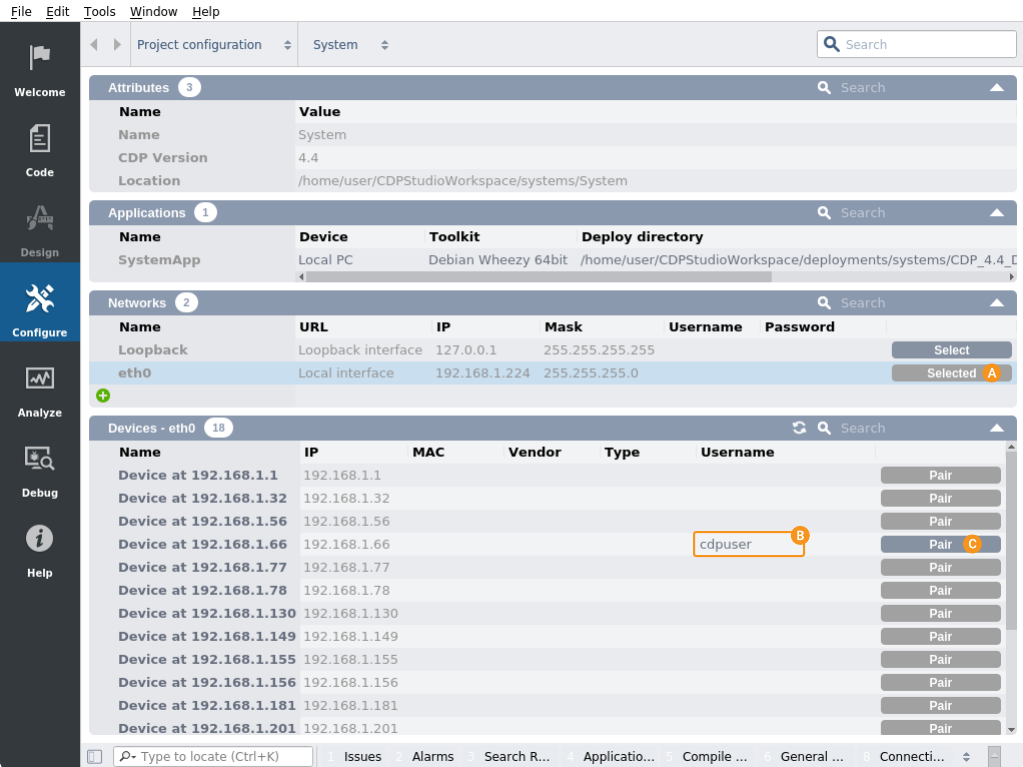
Assign the Device
In the Applications table, each application allows you to assign a Device and select a Toolkit for deployment. To designate a target device, simply choose the desired Device for the corresponding application (). The list of available devices is governed by which devices are paired in the Devices table.
When you select a device, the appropriate toolkit is automatically set in the Toolkit field. If the toolkit is not installed, an informational warning appears at the bottom of CDP Studio, indicating that it must be installed.
If you want to use a different toolkit, you can change it to any of the installed toolkits. For help on selecting the correct toolkit, please refer to the Toolkit documentation.
Note: Choosing the incorrect toolkit may lead to improper functioning of the application.
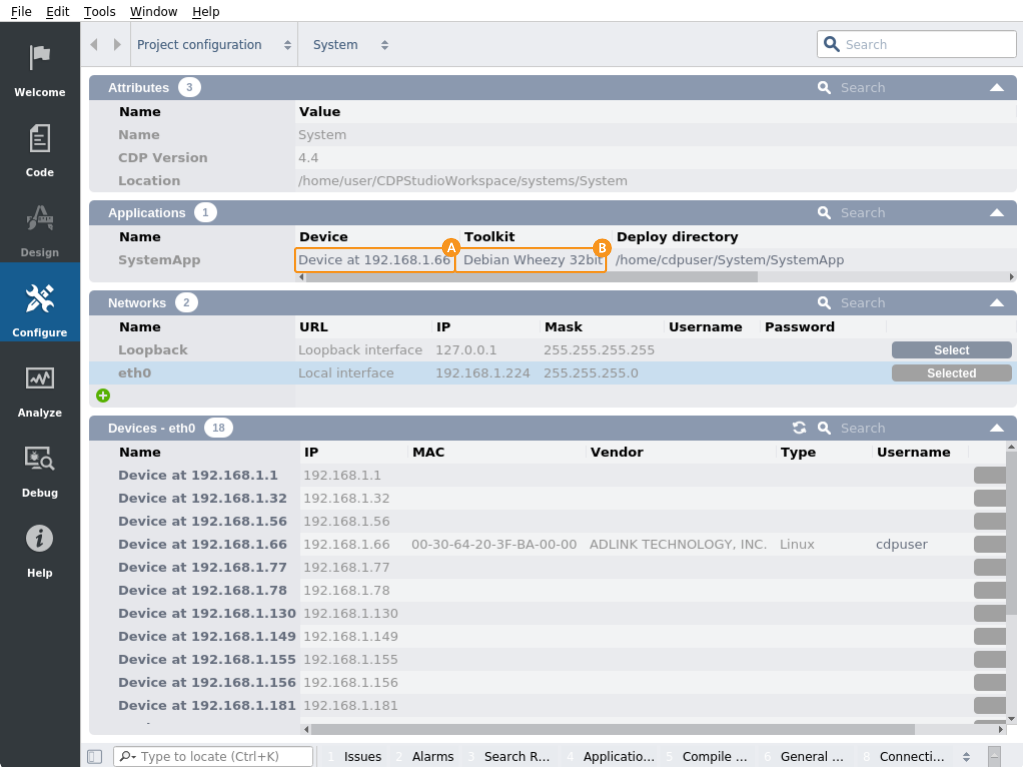
Deploy and Run the System/Application
Once everything is setup correctly the deployment process can be executed from the system or the application context menu (). If started on a system, it will deploy and run all applications under this system. If started on application, it will deploy and run only this application.
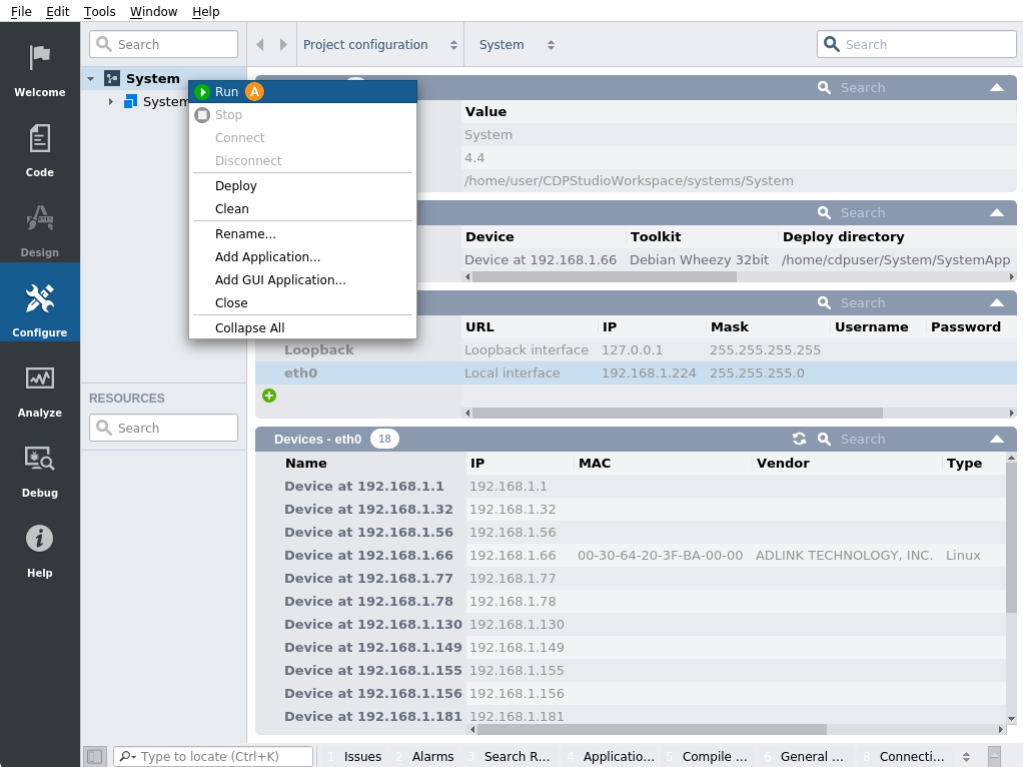
More toolkits can be found and installed through the CDPStudio Maintanance Tool
Deploying to Windows Machines
To be able to deploy to a Windows machine you must first set up a Cygwin SSH server on it. Please refer to this manual. Once it is set up you can use the credentials of any privileged user account (Windows user account) on that machine for deployment.
Deploy to a Remote Network
It is possible to scan for devices in remote networks and deploy applications onto them if you add your own networks into the Networks table. To add a remote network, you need to specify its subnet ip and subnet mask. After that, devices from this network are populated and you can assign them to your applications.
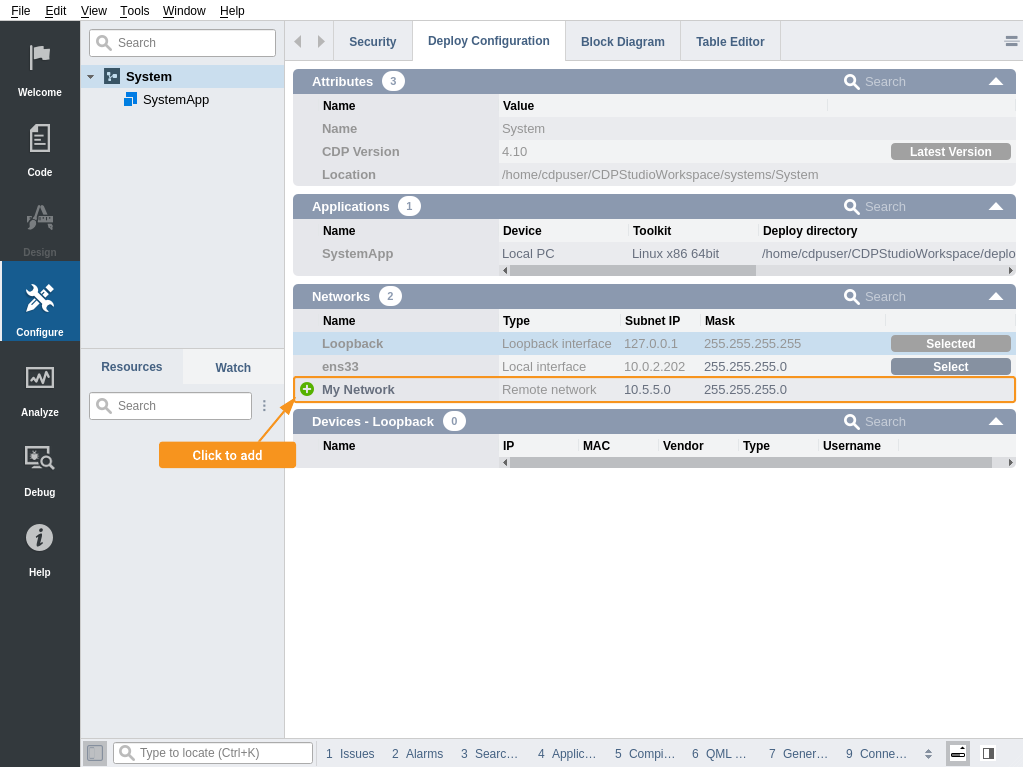
A common situation for using remote networks is when using VPN or SSH tunneling to isolate CDP systems from the public internet. Read more in the Remote Access Over SSH manual.
Manually Running Scripts and Commands on a Remote Device
It is possible to manually run shell scripts on a remote device by choosing "Run Custom Script..." from devices table context menu. There are also premade scripts like App Manager that can be found under "Run Script" submenu. Read more about the App Manager here. To execute commands manually, simply choose "Open Remote Shell" and type in the commands that you want to execute.
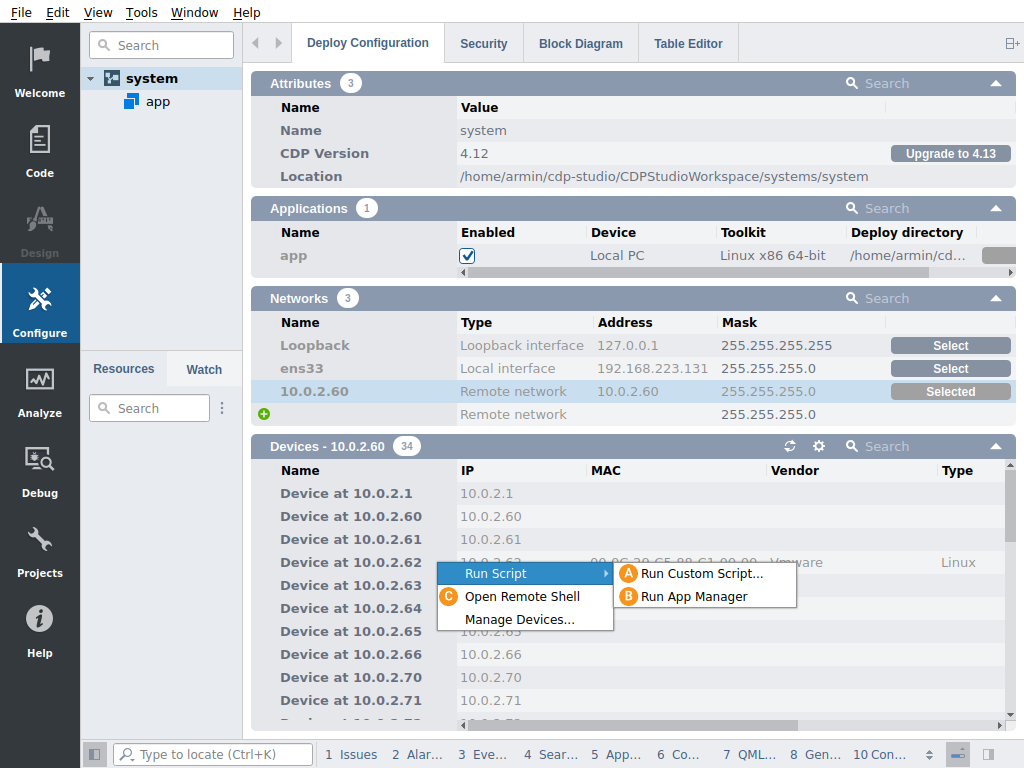
Automatically Running Scripts Pre- or Post-deployment
CDP Studio supports configuring scripts as part of application deployment. Select Edit from Scripts column in Applications table. Configure either a local script, which is run on host machine even when remote target is seleted. Or configure a remote script which is always run on remote target. You can reorder the scripts and disable them when needed. We suggest adding scripts under the project folder so they are always available even when moving the project. Scripts are run when application project is deployed and the output is seen in Terminal Output pane.
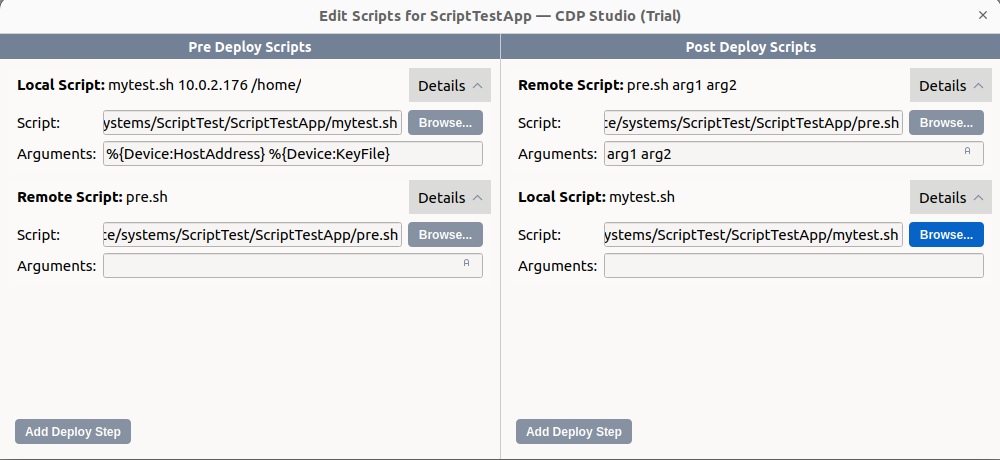
Note: When using shell scripts on Windows make sure "bash.exe" is in path. Otherwise the script execution will fail.
When adding arguments, notice there is an state variable selector integrated on the right hand side of the argument field. From there it is possible to find some useful system state variables and pass them into the script as arguments. E.g eDevice::HostAddress, eDevice::KeyFile etc.
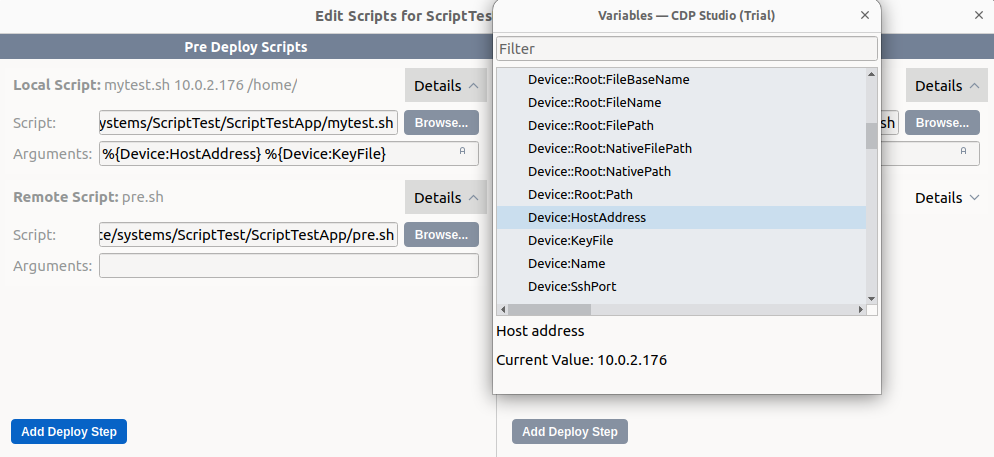
Managing a Device
In some use cases it might be required to change the default private key that is used for SSH access. This is possible via "Manage Devices" once the device has been found.
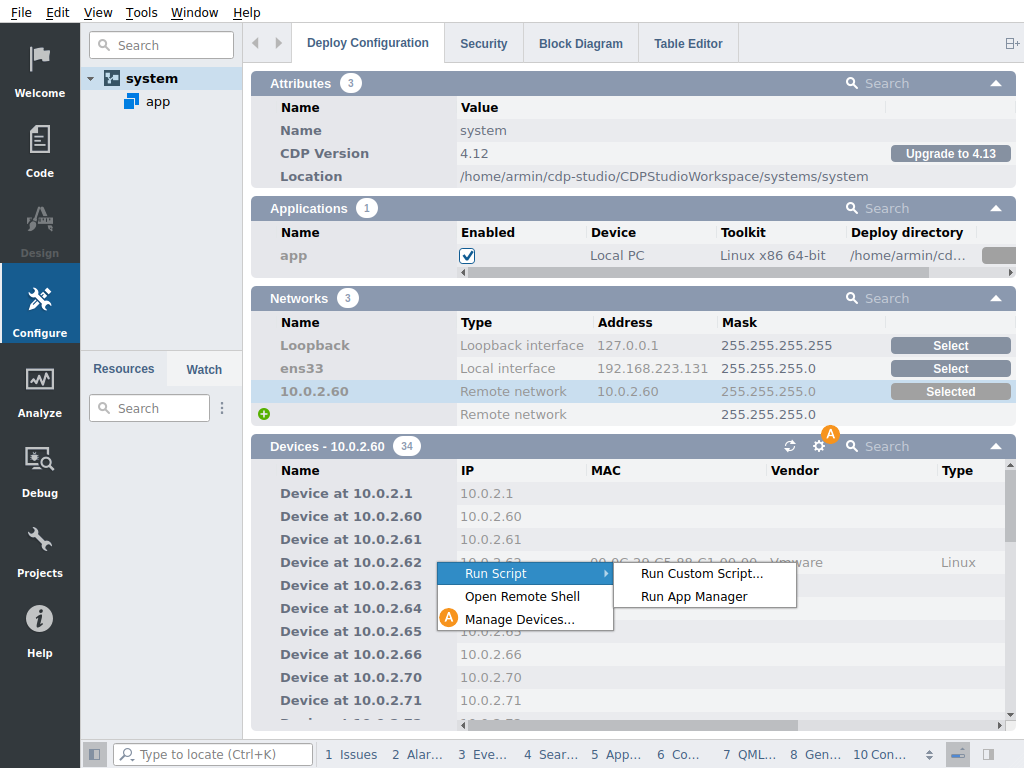
Selecting "Manage Devices" opens up the following dialog:
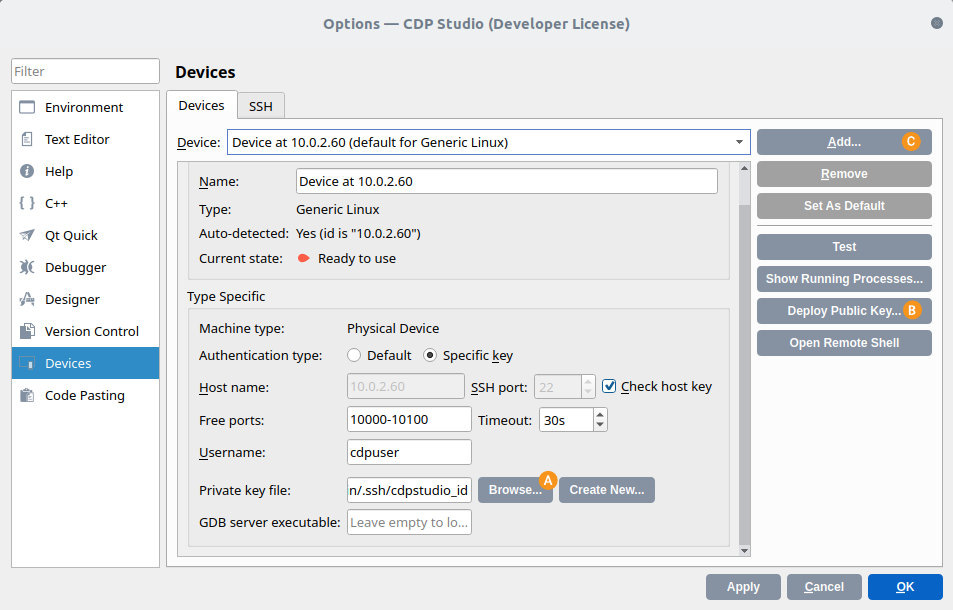
In this dialog you can select the device to configure from the Device: drop-down list. From there you can Test the connection to the device, change the private key and even pre-deploy a public key to the device .
Note:
- It is always advisable to back up your access token(s) to a safe store. If you lose your access token(s), you could be completely and permanently locked out of the device!
- Make sure to always keep your access-token(s) safe and secure from unauthorized access.
Custom Devices can be added manually to CDP Studio. Be aware that the Devices table only shows devices from the selected network. To solve that, you can create a network to manage that specific device.
Get started with CDP Studio today
Let us help you take your great ideas and turn them into the products your customer will love.